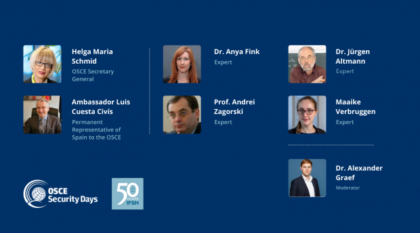Dialogue and engagement needed for addressing security threats and new technologies in arms control, say participants at OSCE Security Chat
VIENNA, 16 June 2021 — We need constructive dialogue and re-engagement at all levels of arms control to address current and future security threats and the challenges posed by new technologies, agreed participants at the OSCE Security Chat held online today.
“Provocative actions, a risk-prone environment, low transparency on military activities, and a high-degree of mistrust is what defines the current European security climate,” said OSCE Secretary General Helga Maria Schmid during her opening remarks. “The instruments we signed up to many years ago need to encompass both old and new threats, including emerging technologies, to our security. This requires engagement at the highest levels in our capitals. We can’t afford to leave this for another day: the upward spiral of increasing military activity closer to adversaries’ borders and distrust among states, joined together in the OSCE, needs to be reversed.”
The Security Chat, organized by the OSCE and the Institute for Peace Research and Security Policy at the University of Hamburg (IFSH), brought together over 250 participants and examined the relevance of the 1996 OSCE Framework for Arms Control, including in the Lisbon Document, and its guiding principles. The Chat also explored the Framework’s relationship to emerging technologies in already deployed modern weapon systems and those expected to be used in the near future.
“Emerging technologies pose, and will continue to be, a challenge to security, as much as an opportunity to reinforce security in terms of, for example, improved capacities for verification and enhanced transparency through information exchange,” said Ambassador Luis Cuesta Civís, Permanent Representative of Spain to the OSCE. “The Lisbon Framework in itself has not lost any of its relevance, but the arms control obligations and Confidence- and Security-Building Measures (CBSMs) that it refers to need to be not only fully implemented but also further developed to put them in line with the new realities.”
The further development of the arms control framework is an indivisible and integral part of the common security of OSCE participating States, said Andrei Zagorski, Head of Department at the Evgeniy Primakov National Research Institute of Word Economy and International Relations (IMEMO) in the Russian Academy of Science. “The more recent degeneration of the European security landscape turning away from cooperative security and returning to mutual deterrence emphasizes the importance of the goals and methods of arms control, as set forth in the Framework, for strengthening security and stability in the OSCE area.”
Anya Fink, a research analyst with the Russia Studies Program at the Center for Naval Analyses, outlined the evolution of military technologies over the last 30 years and the challenges they pose. Noting how this evolution has not yet been accounted for in the modern arms control architecture, Fink said, “there is a lot of room for creativity and a significant need for dialogue to get us to a place where we are able to develop new measures for transparency and predictability of these systems.”
Jürgen Altmann, a physicist and peace researcher at TU Dortmund University in Germany, explained how OSCE CSBMs have helped further transparency and co-operation between states for years, but need to be updated to reflect today’s arms control environment. He proposed extending existing CSBMs for land and air forces to cover cyber forces and selecting CSBMs that accommodate cyber weapons’ need for greater secrecy and their intangibility compared to traditional weaponry such as battle tanks and combat aircrafts.
Looking toward the future of military technology, Maaike Verbruggen, a Doctoral Researcher at the International Security Cluster, considered ways to regulate and validate these advancing technologies, such as artificial intelligence, and their interactions through networks. She encouraged states to work together to address challenges of regulation and validation to build confidence among states.
